Looking for a quick reference guide on attracting the birds of Minnesota to your feeders? Look no further!
Below I’ve listed (in alphabetical order) birds you can attract in Minnesota, their preferred food, and the top bird feeder options. I’ve also provided tidbits based on my experience and some of my top food and feeder picks for birds I’ve had success with.
Disclaimer: Some links found on this page might be Amazon affiliate links. If you click an affiliate link and make a purchase, I might earn a commission. As an Amazon Associate I earn from qualifying purchases.
Before diving into the specific birds, here are a handful of universal things you can do to increase your chances of bringing birds to your yard before you even hang up a feeder.
- Provide water (especially a heated bird bath in the winter)
- Avoid using pesticides
- Have trees and shrubbery nearby
- Plant native plants in your yard
- Keep your cats indoors
- Clean your bird feeders every few weeks to prevent disease from spreading
Bird Feeder References (links to examples on Amazon)
Suet Log Feeder (my favorite – find this at a Wild Bird Store in the Twin Cities metro!)
Bird Feed References (links to examples)
Mealworms (dried – check out your local bird store for live mealworms!)
Sunflower hearts (no shell or mess)
Authors note: I’ll be skipping birds of prey, rare and nuisance birds like Cowbirds, House Sparrows, Grackles, etc. in this article.
American Goldfinch

What Time of Year?
Year-round in Southern Minnesota. In the summer in Northern Minnesota.
What’s the Best Bird Seed for Goldfinches?
Sunflower chips (my top choice) and nyjer seed
My Top Online Bird Seed Recommendation for Goldfinches:
Valley Farms Sunflower Hearts Wild Bird Food – 15 lbs
What kind of bird feeder suits them?
Just about any kind, but tube feeders are best. You can also use a sock feeder filled with nyjer seed for Goldfinches.
Other tips?
If you have the means to do so, plant native thistle plants as an organic way to attract Goldfinches to your yard!
Related: 4 Tips for Attracting American Goldfinches to your Yard
The Range of American Goldfinch
Orange – Summer Breeding Range, Purple – Year-Round Range, Blue – Winter Range

American Robin

What Time of Year?
Year-round (more common in the spring through fall), everywhere in Minnesota.
What’s the Best Food for Robins?
Fruits (apples, oranges, berries, raisins), mealworms
What’s the Best Bird Feeder for Robins?
Food on the ground or a large platform feeder
Other tips?
I haven’t had luck bringing a robin directly to my feeders. However, they’re familiar visitors in the surrounding area looking for worms and berries in trees. So, try putting out diced fruit like apples in the springtime and you can get lucky.
Baltimore Oriole
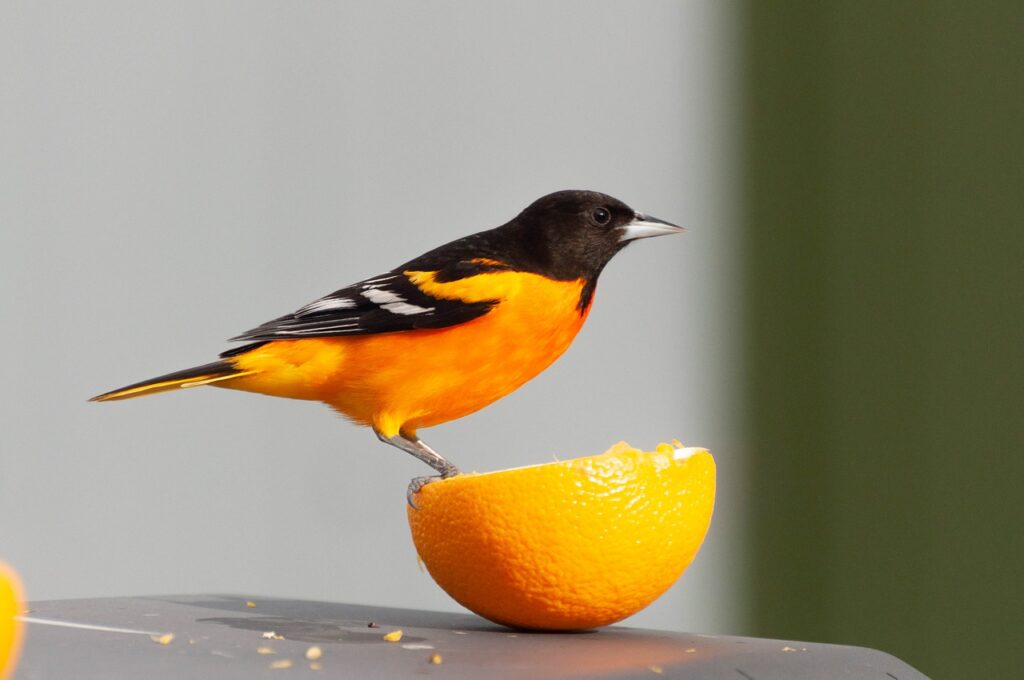
What Time of Year?
The spring and summer everywhere in Minnesota.
What Should You Feed Baltimore Orioles?
Grape jelly (top pick), BirdBerry Jelly, oranges, hummingbird nectar, suet (sometimes – they have orange flavors of suet specifically for orioles, but I’ve never had luck with this). Baltimore Orioles will prefer eating mealworms later in the summer during their nesting season.
What’s the Best Bird Feeder for Baltimore Orioles?
A specialty orange/jelly feeder, nectar feeder
My Top Feeder Pick For Baltimore Orioles:
Other tidbits:
Baltimore Orioles arrive from their migration in southern/central Minnesota in late-April or May, which is the best time to have one visit your feeder. However, if they set up a nest nearby, they can visit your feeder through August. I’d recommend having grape jelly out through the spring and then having mealworms through the summer.
The Range of Baltimore Orioles:
Red – Wintering Range, Blue – Breeding Season (Spring until Fall)
Image Credit: Cephas, Wikipedia

Related: How to get Baltimore Orioles Visiting Your Bird Feeder
Black-Capped Chickadee
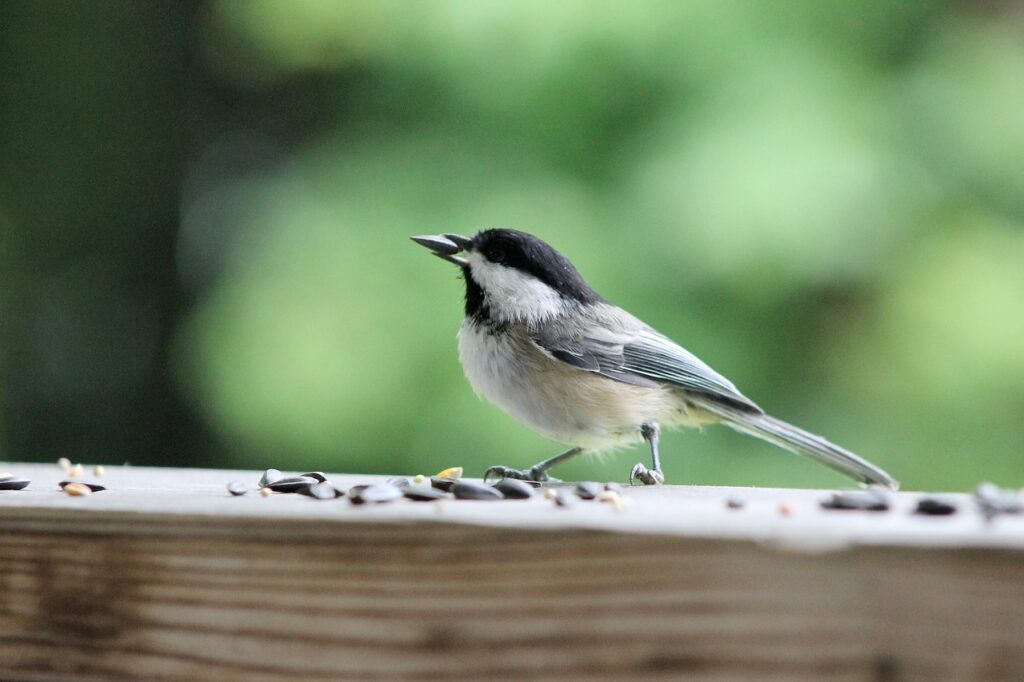
What Time of Year?
Year-round (everywhere in Minnesota).
What Kind of Food Do Chickadees Like?
Nearly everything! They’re the least picky bird I have at my feeders: Sunflower seeds, safflower seed, suet, mealworms (my Chickadee visitors love these).
My Top Amazon Bird Seed Recommendation for Chickadees:
What’s the Best Bird Feeder for Chickadees?
Nearly any feeder. Chickadees aren’t picky!
Other tips?
Check out my deeper dive on attracting chickadees here
Blue Jay

What Time of Year?
Year-round (everywhere in Minnesota).
Purple – Year-Round Range of Blue Jays, Blue – Non-Breeding Range

What Should You Feed Blue Jays?
Peanuts in the shell (best bet), peanut bits, suet, sunflower seeds, corn.
My Top Amazon Bird Seed Recommendation for Blue Jays:
Premium Peanuts In Shell – Wild Bird – Wildlife Food
What’s the Best Bird Feeder for Blue Jays?
Blue Jays need a sturdy hopper or platform feeder with a lot of room to support their weight. They’re a larger feeder bird.
Other tidbits:
Attract Blue Jays with peanuts on a sturdy platform feeder, or simply serve them on the ground (beware as this will also certainly attract squirrels and chipmunks – not that I would know…). I feel Blue Jays get an unfair reputation as a bully bird at feeders. I love them! They bring a lot of boisterous energy to my feeding station.
This is just in my experience, but I tend to get the most Blue Jays visiting in the fall.
Related Content: How to Attract Blue Jays to Your Bird Feeder
Cedar Waxwing

What Time of Year?
Year-round (in Southern-half of Minnesota). During the summer in Northern Minnesota.
The Range of Cedar Waxwings: Yellow – Summer Only Range, Green – Year-Round, Blue – Winter Range

What Kind of Food do Cedar Waxwings Like?
Fruit! Your best bet is to have a native tree or shrub in your yard with small berries (dogwood, cedar, winterberry, etc.).
What Kind of Bird Feeder Suits Them?
Cedar Waxwings rarely visit feeders but are known to visit bird baths in flocks. You may also have luck with a bird seed mix that has dried fruit in it.
Chipping Sparrow

What Time of Year?
Spring and summer. Check the orange in the range map below for their migration range!

What’s the Best Bird Seed for Chipping Sparrows?
Millet (top choice), sunflower seeds, cracked corn
My Top Amazon Bird Seed Recommendation for Sparrows:
What’s the Best Bird Feeder for Chipping Sparrows?
Just about anything
Other tips?
Mix in some millet into your sunflower seeds to attract native sparrows in the spring. I’ve had Chipping Sparrows arrive at my feeders by late-March!
Common Redpoll

What Time of Year?
Winter (much more common in Northern Minnesota). Here’s a link to their range map from Cornell.
What’s the Best Bird Seed for Redpolls?
They particularly like Nyjer seed and also sunflower chips
My Top Amazon Bird Seed Recommendation for Redpolls:
Wild Delight Special Finch Food
What’s the Best Bird Feeder for Redpolls?
A tube feeder is best (but any feeder will likely work)
Other tips?
Common Redpolls are an erratic migrating bird from Canada. You may see large groups some winters and none in other years. It depends on their food supply and migration route.
Dark-Eyed Junco

What Time of Year?
Fall through spring (Summertime in northernmost Minnesota). Dark Eyed Juncos typically arrive in the Twin Cities metro in October and stay until April.
What’s the Best Bird Seed for Juncos?
White millet (best bet), hulled sunflower seed, cracked corn, peanut hearts.
My Top Amazon Bird Seed Recommendation for Juncos:
What Kind of Bird Feeder is Best for Juncos?
A ground feeder (seed knocked down from hanging feeders will also work).
Other tips?
A sure sign that winter is coming, Dark-Eyed Juncos start appearing during October in the Twin Cities metro.
The Range of Dark Eyed Juncos
Yellow – Summer Breeding Range, Green – Year-Round Range, Blue – Wintering Non-Breeding Range
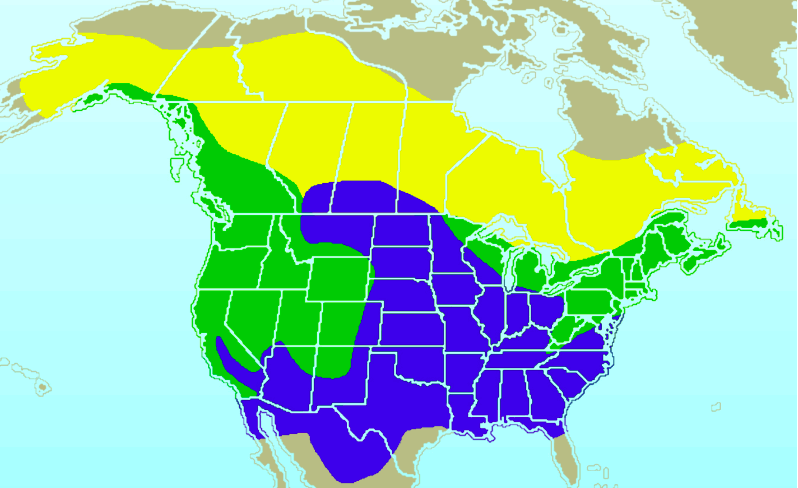
Downy Woodpeckers

What Time of Year?
Year-round (everywhere and abundant in Minnesota).
What Kind of Food do Downy Woodpeckers Like?
Suet (top choice – especially peanut flavored), will also eat sunflower seeds on occasion
What’s the Best Bird Feeder for Downy Woodpeckers?
Suet feeders of all types (they aren’t picky).
My Top Amazon Bird Feeder Pick For Downy and Hair Woodpeckers:
Wildlife Sciences Suet Plug Feeder
Other tips?
Once you attract a Downy Woodpecker to your feeders, they’ll likely be back every single day. I’ve had a pair of Downy Woodpeckers visiting my feeders for about a year now. They show up like clockwork.
Eastern Bluebird

What Time of Year?
Late-spring and summer (rarely in the winter).
Yellow – Summer Breeding Range, Green – Year-Round Range, Purple – Wintering Range
Credit: rbrausse, Wikipedia

What’s the Best Food for Bluebirds?
Live mealworms
What’s the Best Bird Feeder for Bluebirds?
A platform or ground feeder.
Other tips?
Getting live mealworms and putting them in a cup or sturdy feeder is your best bet to draw one of these awesome birds. Eastern Bluebirds also love to live in nest boxes if you have space. You’ll probably have the best luck with that approach if you live in a more remote area.
Evening Grosbeak

What Time of Year?
In northeast Minnesota: Year-round
In central Minnesota: Winter
What’s the Best Food for Evening Grosbeaks?
Sunflower seeds
What’s the Best Bird Feeder for Evening Grosbeaks?
A hopper or platform feeder (they are heavy finches)
Other tips?
Irregular migrants and not likely to visit your feeders consistently every year. If they do, they will often appear in large flocks and eat a lot of sunflower seeds (not a bad problem to have. These birds look awesome!).
Green – Year-round Range, Yellow – Wintering Range
Credit – Wikipedia Commons

Hairy Woodpeckers
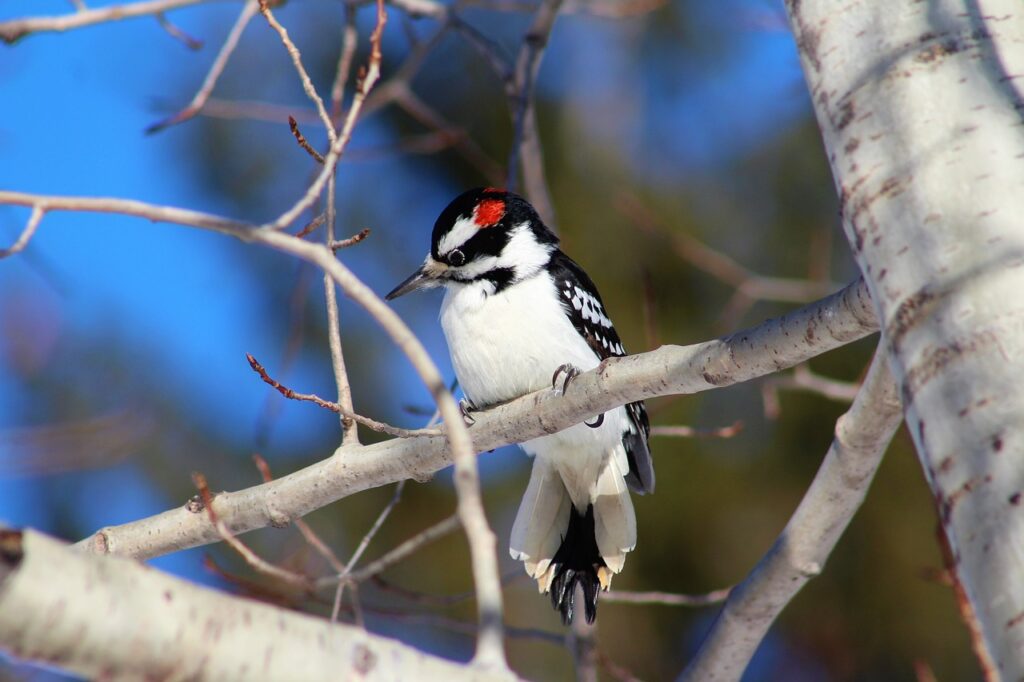
What Time of Year?
Year-round everywhere in Minnesota.
What Kind of Food do Hairy Woodpeckers Like?
Suet (top choice – especially peanut flavored), will also eat sunflower seeds
What’s the Best Bird Feeder for Hairy Woodpeckers ?
Suet feeders of all types. I have Hairy Woodpeckers who visit my suet log feeder.
Other tips?
If you have dead trees in your yard, consider leaving them for Hairy Woodpeckers to nest in!
House Finch

What Time of Year?
Year-round everywhere in Minnesota.
What’s the Best Bird Seed for House Finches?
Sunflower seed (top choice), safflower seed, nyjer seed
My Top Amazon Bird Seed Recommendation for House Finches:
Meadow Ridge Farms Black Oil Sunflower Seed
What’s the Best Bird Feeder for House Finches?
Just about anything
Other tips?
House finches are often the first birds to find a new feeder (they were my first birds to visit). I’ve randomly found that they also go bananas for grape jelly in my Oriole feeder during the spring.
Range of House Finches
Green: Year-Round Range, Yellow: Breeding Range
Image Credit: Cephas, Wikipedia
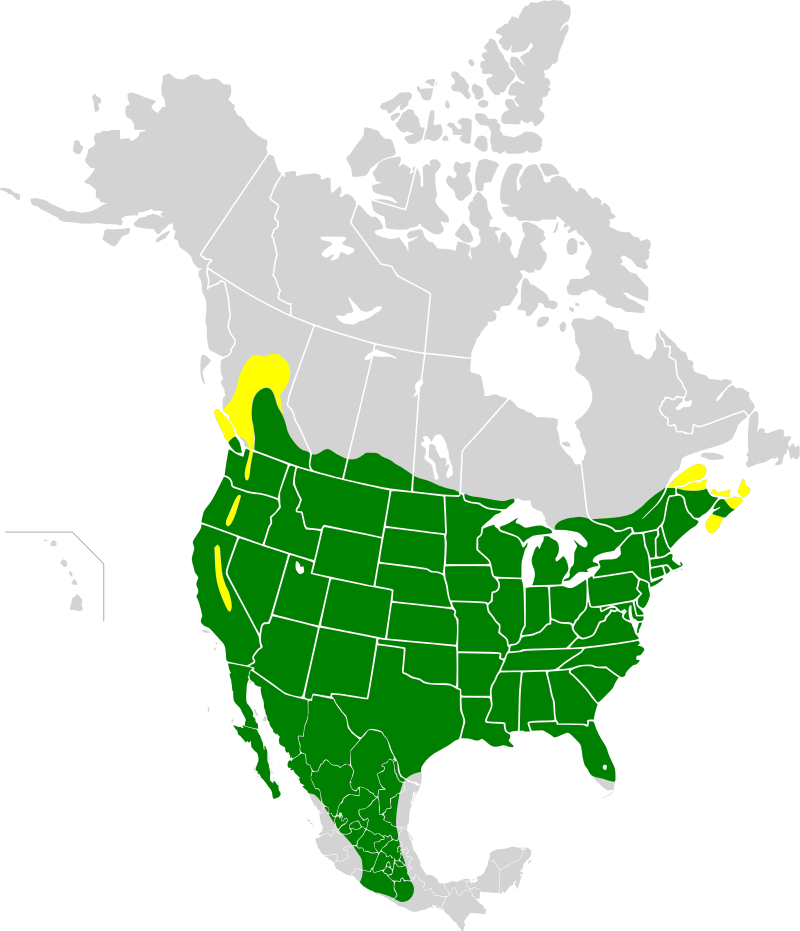
Indigo Bunting

What Time of Year?
Late-Spring/Summer everywhere in Minnesota
What’s the Best Bird Seed for Indigo Bunting?
White millet (best choice), hulled sunflower seed, nyjer seed
What’s the Best Bird Feeder for Indigo Bunting?
They enjoy eating from the ground, or on small tube feeders
Other tips?
This can be a challenging bird to attract (at least it has been for me). Your best bet is to have your feeders stocked in the spring with white millet and catch them during their migration.
Range of Indigo Bunting
Yellow: Summer Range, Green: Migrating Range, Blue: Winter Range
Image Credit: Wikipedia Commons
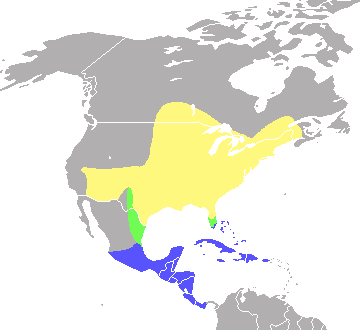
Mourning Dove

What Time of Year?
Year-round in southern Minnesota. Spring/summer in Northern Minnesota.
What’s the Best Bird Seed for Mourning Doves?
White millet (best choice), sunflower seeds, corn
My Top Amazon Bird Seed Recommendation for Mourning Doves:
What kind of bird feeder suits them?
A large platform or ground feeder
Other tips?
Unless you have a large and steady platform feeder, sprinkling millet on the ground is perfect for Mourning Doves. They’re big birds and need a sturdy place to sit.
Orange: Summer Breeding Range, Purple: Year-Round Range, Blue: Non Breeding Winter Range – Image Source: Wikipedia Creative Commons

Northern Cardinal
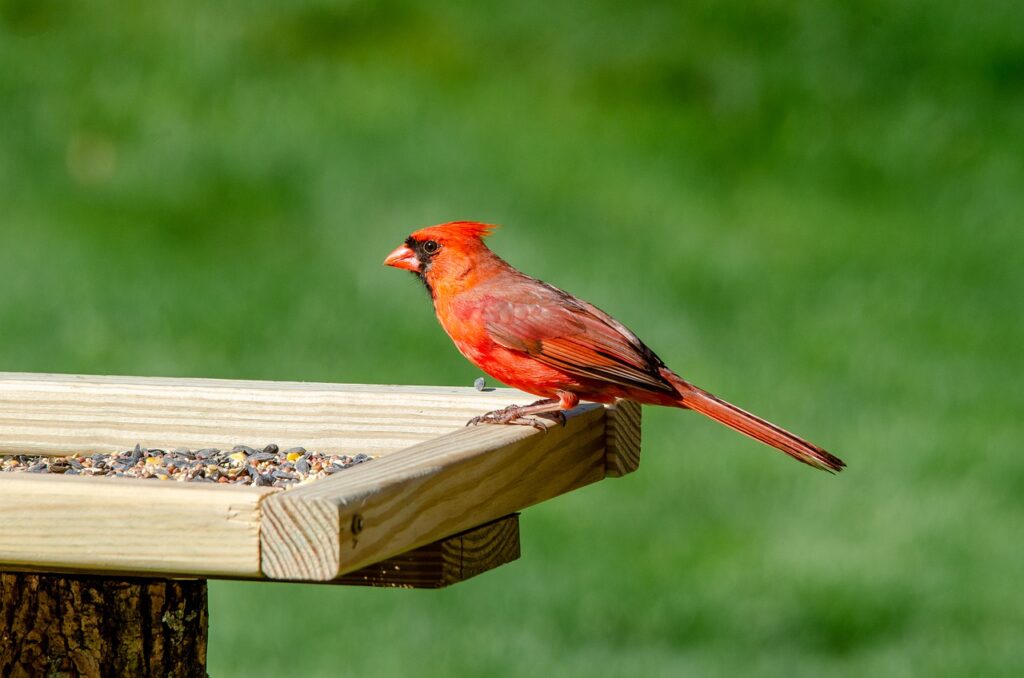
What Time of Year?
Year-round in Southern and Central Minnesota
What’s the Best Bird Seed for Cardinals?
Sunflower seeds (top choice – black oil sunflower), safflower seed, millet, peanuts. There are Cardinal bird seed blends with both sunflower and safflower seeds.
My Top Amazon Bird Seed Recommendation for Cardinals:
Meadow Ridge Farms Black Oil Sunflower Seed
What’s the Best Bird Feeder for Cardinals?
A large platform or ground feeder are the best bird feeders for Cardinals. They will visit most feeders as long as they can support their weight. Cardinals are larger songbirds (7 to 9 inches long).
Other tips?
Have your feeders in a quiet spot with bushes or trees nearby. Cardinals are shy birds and will want to scout out feeders and have a safe place to hide if they feel threatened. In the winter, when they aren’t competing for mates, you have a good chance of attracting several Cardinals at sunrise and sunset.
For more detail, check out my story with 5+ tips for attracting Cardinals to your yard!
Range of Northern Cardinals
Year-Round Range of Northern Cardinals
Source: Wikipedia Commons

Northern Flicker

What Time of Year?
Year-round everywhere in Minnesota
What kind of food do Northern Flickers like?
A rare visitor to feeders (but often use bird baths). Will eat sunflowers, peanuts and suet on occasion
What’s the Best Bird Feeder for Northern Flickers?
A suet or ground feeder
Other tips?
Northern Flickers will use large nest boxes if you have space for one in your yard.
Range of Northern Flickers
Orange: Breeding, Purple: Year-Round, Blue: Non-Breeding
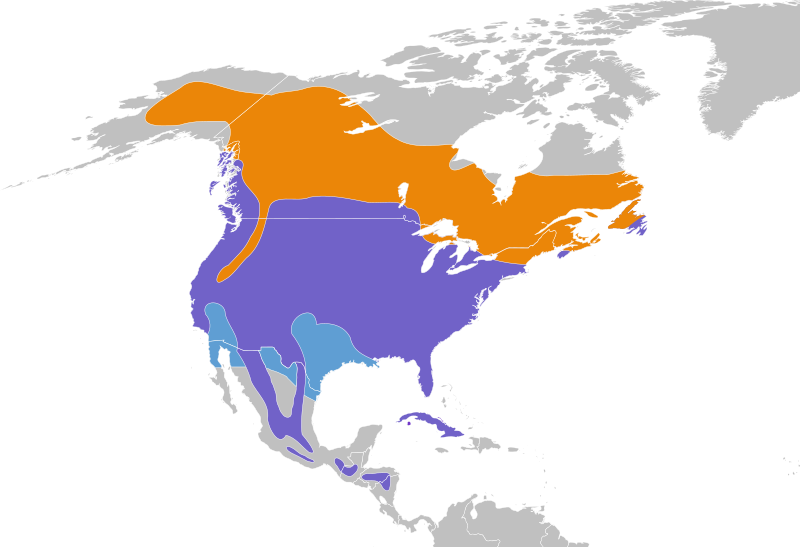
Pileated Woodpecker
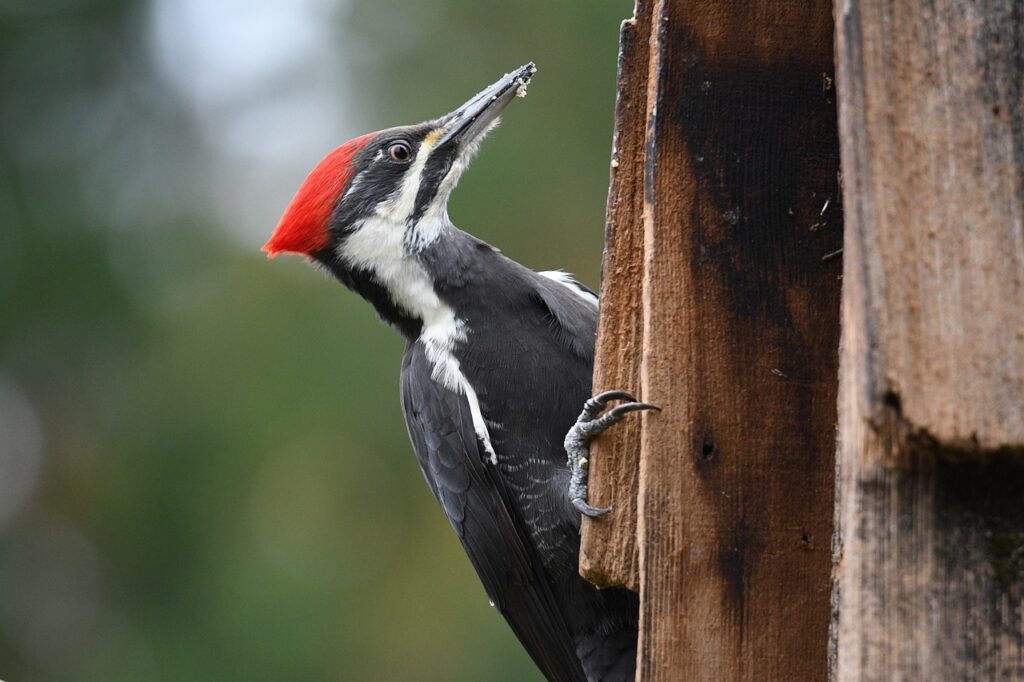
What Time of Year?
Year-round (in most of Minnesota).
What’s the Best Food for Pileated Woodpeckers?
Suet (top choice)
What’s the Best Bird Feeder for Pileated Woodpeckers?
A large suet cage or platform.
Other tips?
Pileated Woodpeckers are HUGE. So, you’ll want to get a suet feeder that’s big enough to support them. Some suet feeders come with large platforms underneath, giving the bird room to balance using its tail.
The Range of Pileated Woodpeckers
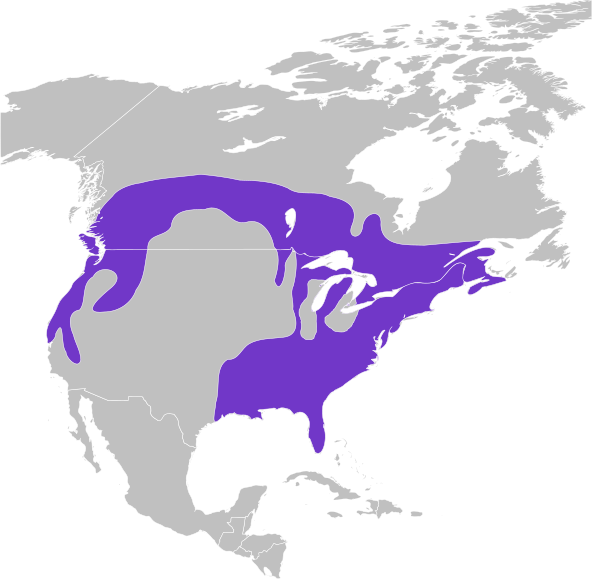
Pine Grosbeak

What Time of Year?
Winter in Northern Minnesota.
What’s the Best Bird Seed for Pine Grosbeaks?
Sunflower seeds (best choice) and suet
What’s the Best Bird Feeder for Pine Grosbeaks?
Large tube, platform and hopper feeders
Other tips?
According to The Cornell Bird Lab, Pine Grosbeaks may also be seen eating grit near roads by forests.
Pine Siskin

What Time of Year?
Winter (Central and Southern Minnesota) Year round in northeast Minnesota
What’s the Best Bird Seed for Pine Siskins?
Nyjer seed, hulled sunflower seeds, suet (maybe)
My Top Amazon Bird Seed Recommendation for Pine Siskins:
Wild Delight Special Finch Food
What’s the Best Bird Feeder for Pine Siskins?
Nearly anything! The Pine Siskin that visits me often loves the large tube feeder I have with a finch blend.
Other tips?
This is another erratic bird based off its food supply and migration. The Cornell Bird Lab says: “Flocks of tiny Pine Siskins may monopolize your thistle feeder one winter and be absent the next.”
The Range of Pine Siskins
Purple: Year-Round, Blue: Winter, Orange: Summer
Source: Cephas, Wikipedia
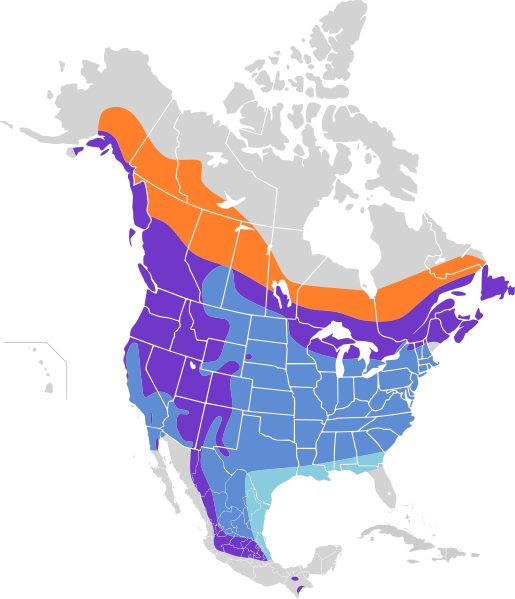
Purple Finch
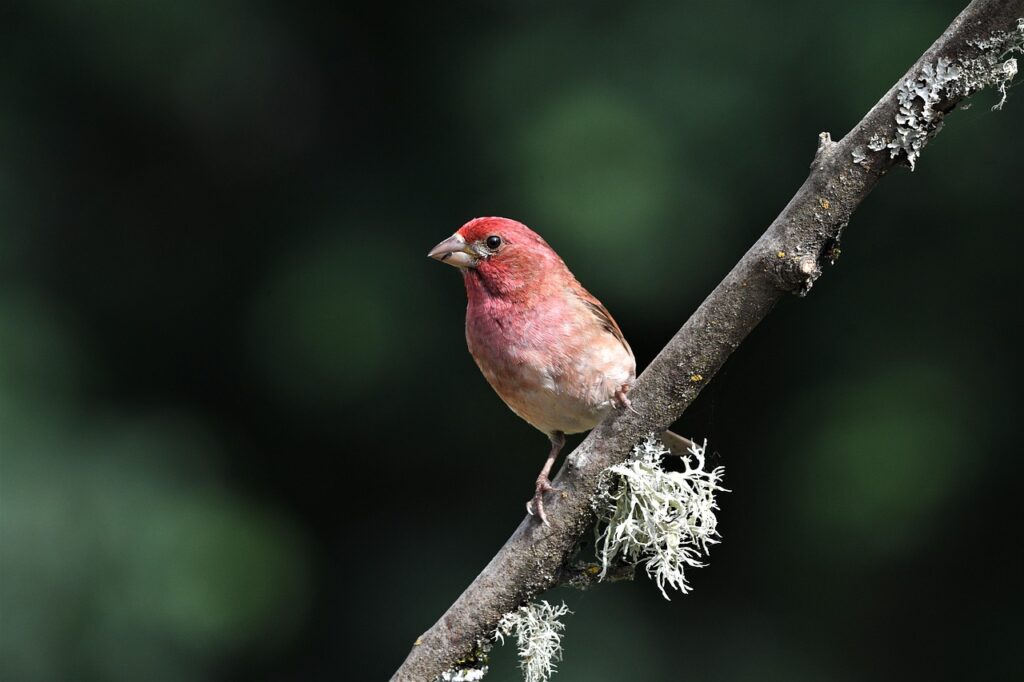
What Time of Year?
Winter (southeast Minnesota) and spring/summer in northern Minnesota.
What’s the Best Bird Seed for Purple Finches?
Sunflower seed (top choice), safflower seed, nyjer
What’s the Best Bird Feeder for Purple Finches?
Just about anything.
Other tidbits?
Purple Finches are more rare than the similar looking House Finches. Male Purple Finches have a red cap versus a brown cap for House Finches.
The Range of Purple Finches
Pink: Summer, Orange: Winter, Green: Year-Round
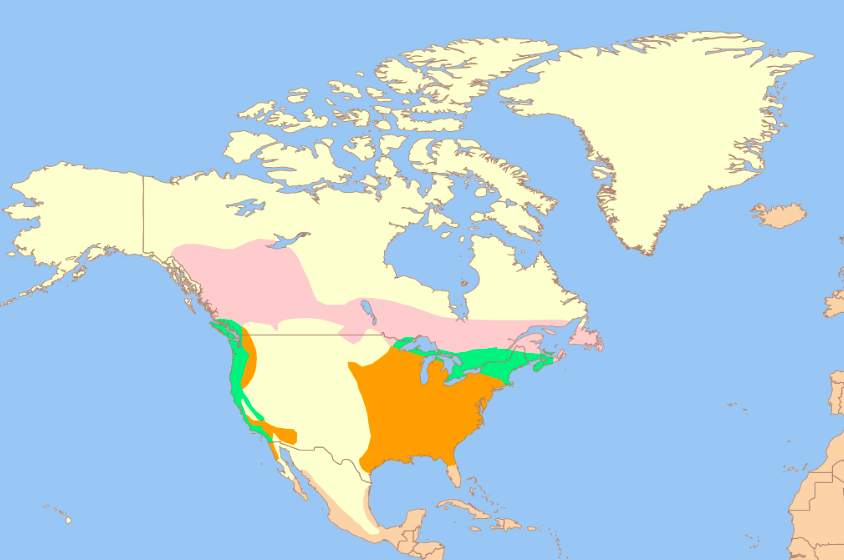
Red Bellied Woodpecker
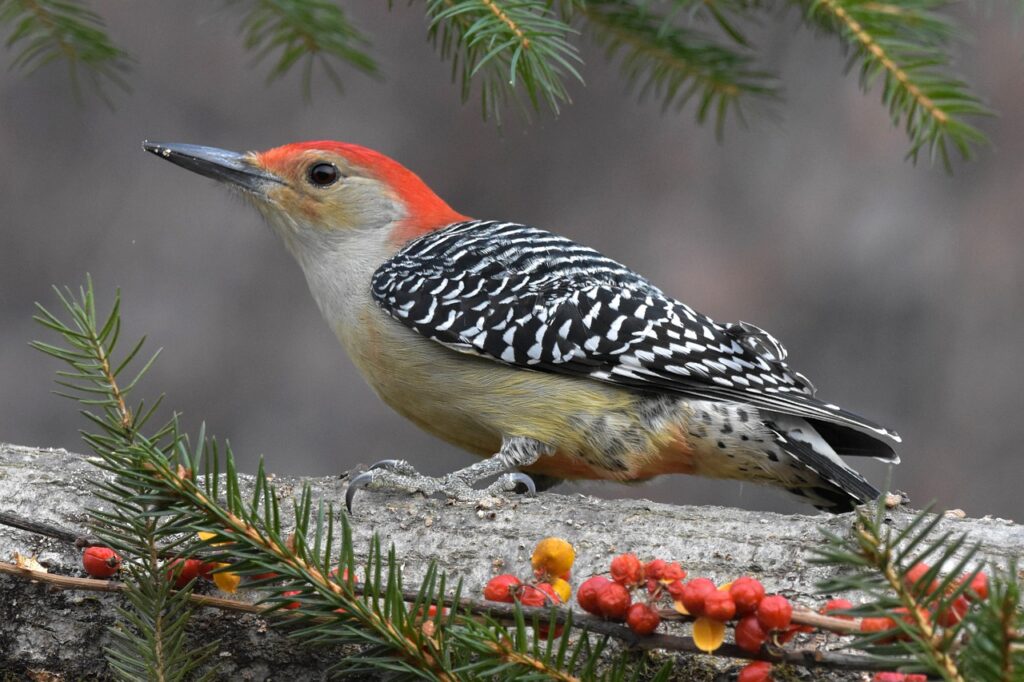
What Time of Year?
Year-round everywhere in Minnesota
What’s the Best Food for Red Bellied Woodpeckers?
Suet (best choice), sunflower seeds, peanuts
What’s the Best Bird Feeder for Red Bellied Woodpeckers?
A sturdy suet feeder or platform feeder.
Other tips?
You’ll have luck attracting a Red Bellied Woodpecker if you live near any sort of wooded area and offer a suet feeder. Also, they’re fond of sunflower seeds on occasion, and will also taste hummingbird nectar in the summer.
Red Breasted Nuthatch

What Time of Year?
Winter in the southern half of Minnesota. Summer in the northern half
What’s the Best Food for Red Breasted Nuthatches?
Peanuts, suet and sunflower seeds
What’s the Best Bird Feeder for Red Breasted Nuthatches?
Almost anything
Other tips?
Offer an assortment of seeds on a variety of feeders to attract nuthatches. They will often sample several seeds before picking their favorite and fly off.
The Range of Red Breasted Nuthatches
Purple: Year-Round, Blue: Non-breeding
Credit: Cephas, Wikipedia
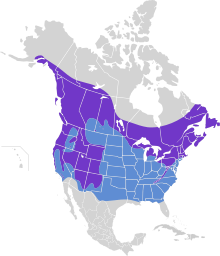
Rose Breasted Grosbeak

What Time of Year?
Everywhere in Minnesota during the spring and summer
What’s the Best Bird Seed for Rose Breasted Grosbeaks?
Sunflower (top choice), safflower
What’s the Best Bird Feeder for Rose Breasted Grosbeaks?
A large platform, hopper or tube feeder
Other tips?
They’re likely to visit feeders in the late spring during migration when they need extra energy. Have native berry plants and shrubs in your yard for another chance to attract these birds.
The Range of Rose-Breasted Grosbeak
Yellow: Breeding-Range, Orange: Migration-Only, Blue: Winter-Range

Ruby Throated Hummingbird
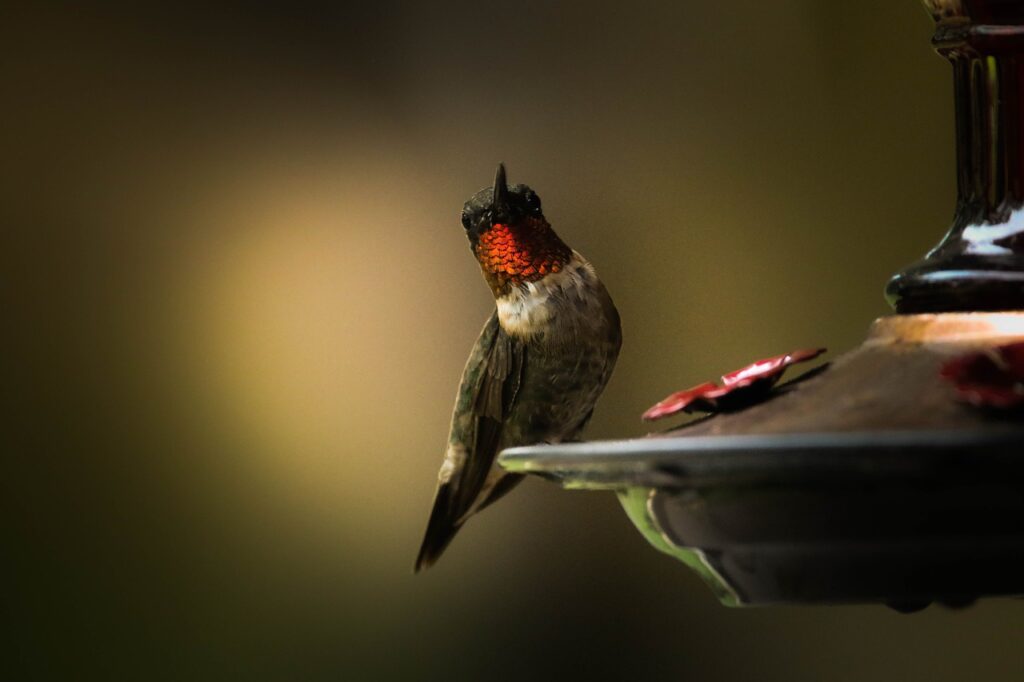
What Time of Year?
May through mid-October, everywhere in Minnesota.
What’s the Best Food for Hummingbirds?
Nectar, flowers in your yard. You can easily make your own hummingbird nectar from home by combining four parts water with one part table sugar.
IMPORTANT: You must completely clean out your hummingbird feeders every other day at minimum. Clean them every day if it’s hot outside or if the feeders are in direct sunlight. The nectar easily starts growing bacteria and mold. This can harm or kill the hummingbird if you aren’t diligent!
What’s the Best Bird Feeder for Hummingbirds?
A nectar hummingbird feeder that has the color red or yellow. Both of those colors attract hummingbirds! I tend to pick red-colored feeders because yellow can also attract bees.
Here’s a link to a roundup of some of the best hummingbird feeders you can find online.
Other tips?
I’ve had luck attracting hummingbirds by hanging up a native flower plant in the summer.
Related: How to Attract Hummingbirds to a Feeder in Just Three Steps
Range Map for Ruby Throated Hummingbirds
Orange: Summer, Yellow: Migration-Only, Blue: Winter-Range

Scarlet Tanager

What Time of Year?
Summer
What’s The Best Food for Scarlet Tanagers?
Suet, mealworms, oranges, raisins
What’s the Best Bird Feeder for Scarlet Tanagers?
Fruit, suet or platform feeder
Other tips?
I haven’t been fortunate to have had a Scarlet Tanager visit my feeders. I’m told that you have the best shot at spotting one before or after storms in the late spring. So, have your feeders stocked with a variety of suet and fruit. Good luck!
The Range Map For Scarlet Tanager
Orange: Summer, Yellow: Migration-Only, Blue: Winter-Range

Song Sparrows

What Time of Year?
Year-round in Southern Minnesota. During the spring through fall for the rest of the state. Check the range map below! Purple is their year-round range and orange is their migration range. I live in the Twin Cities area and don’t usually see Song Sparrows in the winter.
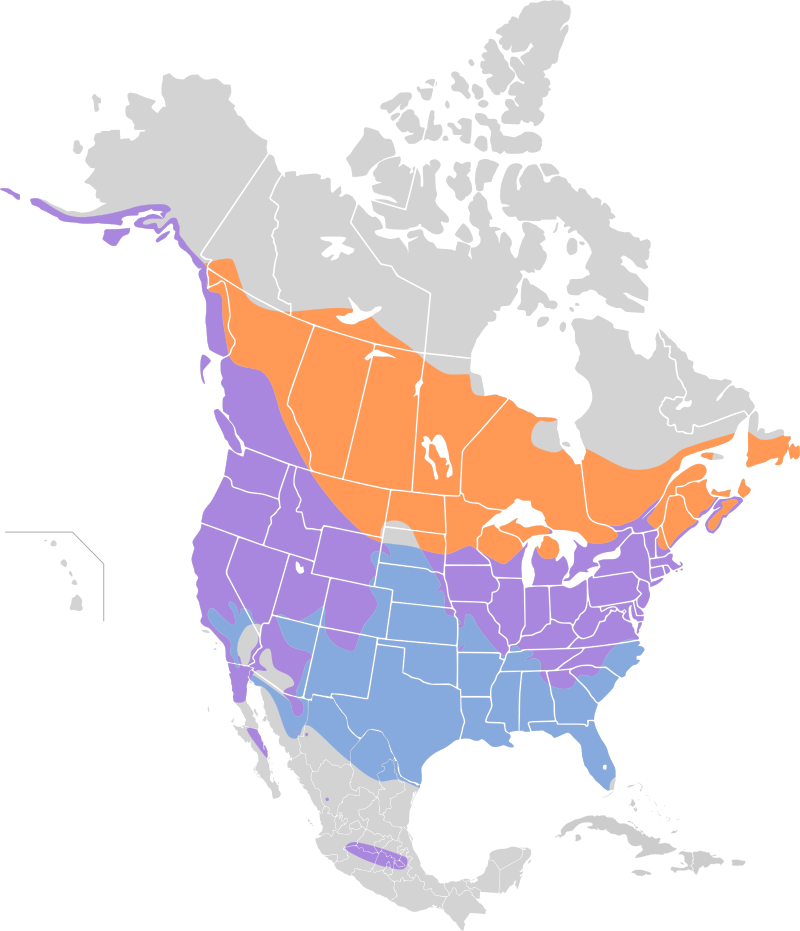
What’s the Best Bird Seed for Song Sparrows?
Millet (top choice), sunflower seeds, cracked corn
My Top Amazon Bird Seed Recommendation for Song Sparrows:
What’s the Best Bird Feeder for Song Sparrows?
Song Sparrows usually eat seed straight from the ground. A ground feeder will also appeal to them.
Other tips?
Song Sparrows are surprisingly aggressive at my feeders! They usually chase away House Sparrows and other song birds to get at the seed on the ground.
Tufted Titmouse

What time of year?
Year-round (on the southeastern tip of Minnesota)
What’s the Best Food for Titmice?
Sunflower (top choice), suet, peanuts, safflower seeds
What’s the Best Bird Feeder for Titmice?
Just about anything
Other tips?
You’re lucky if you happen to live in the limited area in Minnesota (the southwest) where they visit! Although, they will wander further north into the state on rare occasions.
White Breasted Nuthatch
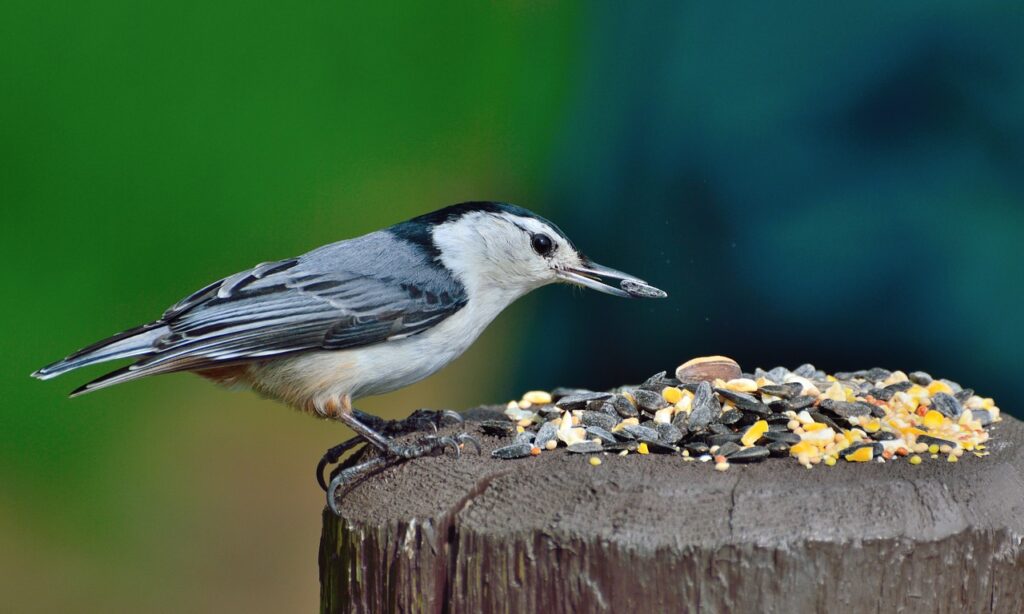
What Time of Year?
Year-round (everywhere in Minnesota)
What’s the Best Bird Seed for White Breasted Nuthatches?
Peanut bits (top choice), sunflower, suet, safflower
My Top Amazon Bird Seed Recommendation for White Breasted Nuthatch:
Lyric Peanut Pieces Wild Bird Food
What kind of bird feeder suits them?
Just about anything
Other tips?
A common year-round visitor for me. Listen for their nasal call – I’ll often hear a nuthatch before it arrives on my feeders. Also, they’re acrobatic and will hang upside down on feeders.
White-Throated Sparrow
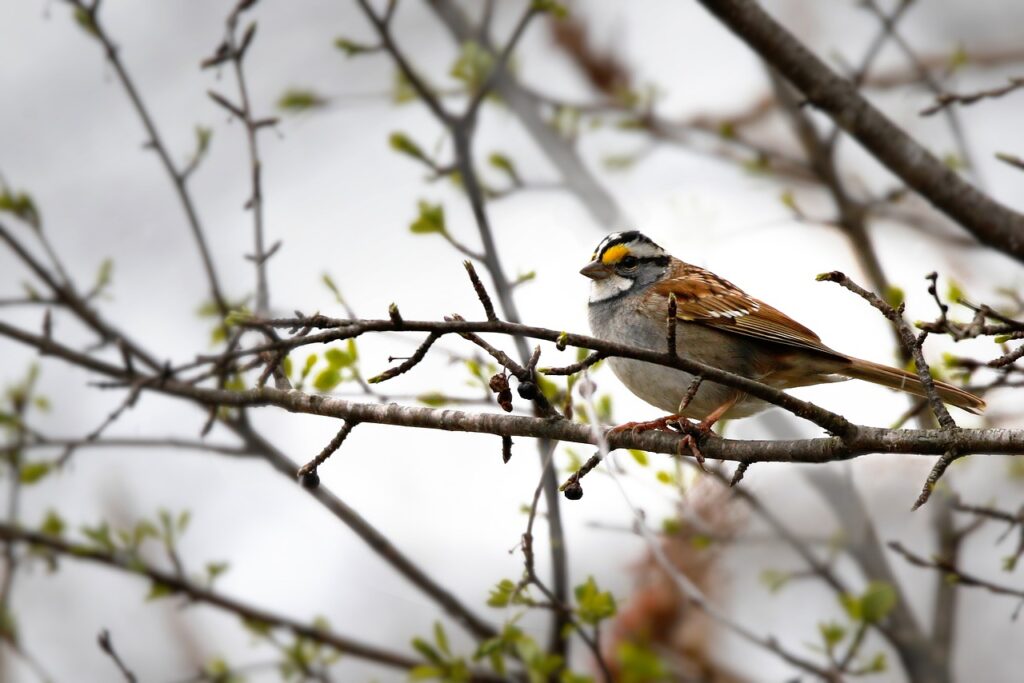
What Time of Year?
Year-round in Northeastern Minnesota. You can see in the range map below that you can also spot White Throated Sparrows during the winter and spring migration in different areas of the state.

What’s the Best Bird Seed for White-Throated Sparrows?
Millet (top choice), sunflower seeds, cracked corn
My Top Amazon Bird Seed Recommendation for White-Throated Sparrows:
What’s the Best Bird Feeder for White-Throated Sparrows?
White-Throated Sparrows usually eat seed straight from the ground. A ground feeder will also appeal to them.
Other tips?
Listen for their calls! I love the whistle sound of White-Throated Sparrows during the winter.
Yellow-Bellied Sapsucker

What Time of Year?
Spring – Summer (everywhere in Minnesota)
What’s the Best food for Yellow-Bellied Sapsuckers?
Suet
What’s the Best Bird Feeder for Yellow-Bellied Sapsuckers?
A suet feeder
Other tips?
Rarely visit feeders but may drop by for some suet on occasion. As their name suggests, most of their diet is sap from maple or birch trees.
Related: The Definitive Bird Seed Power Rankings
Sources: The Cornell Bird Lab, The National Audubon Society, Birds of Minnesota Field Guide and a hefty dose of my firsthand experience.
Other State Bird Feeding Guides
I’m slowly building up my state by state bird feeding guides. If you’re looking for how to attract birds in different states, here are the other states I’ve completed below!
- Alaska Bird Feeding Guide
- Arkansas Bird Feeding Guide
- Iowa Bird Feeding Guide
- Connecticut Bird Feeding Guide
- Illinois Bird Feeding Guide
- Indiana Bird Feeding Guide
- Kansas Bird Feeding Guide
- Kentucky Bird Feeding Guide
- Louisiana Bird Feeding Guide
- Maine Bird Feeding Guide
- Massachusetts Bird Feeding Guide
- Michigan Bird Feeding Guide
- Missouri Bird Feeding Guide
- Nebraska Bird Feeding Guide
- New Jersey Bird Feeding Guide
- New Hampshire Bird Feeding Guide
- New York Bird Feeding Guide
- North Dakota Bird Feeding Guide
- Ohio Bird Feeding Guide
- Oklahoma Bird Feeding Guide
- Pennsylvania Bird Feeding Guide
- Rhode Island Bird Feeding Guide
- South Dakota Bird Feeding Guide
- Texas Bird Feeding Guide
- Vermont Bird Feeding Guide
- West Virginia Bird Feeding Guide
- Wisconsin Bird Feeding Guide

Pingback:5 Time-Tested Ways to Attract Cardinals to Your Bird Feeder - BIRD BITES
Pingback:The Definitive Bird Seed Power Rankings - BIRD BITES
Pingback:Get Started with Bird Feeding in Four Steps - BIRD BITES
Pingback:My Experience and Review of Cole’s Flaming Squirrel Seed Sauce - BIRD BITES
Pingback:The Best Bird Seed for Cardinals - BIRD BITES 2022
Any tips for platform feeders and pesky squirrels?
Hi Kim! I would recommend making your bird seed on the platform feeder spicy. More details here: https://dansbirdbites.com/ranking-the-effectiveness-of-squirrel-bird-feeder-deterrents/
A very nice resource you’ve put together here and I’m happy to see those “5 universal rules” at the top! I wanted to point out some minor things that might improve the reputation of your resource even more. There are 2 photos here of birds that caught my eye as not being from Minnesota –though they do look similar. The Red-breasted Nuthatch pictured above is actually a European Nuthatch, and the Red-bellied Woodpecker directly above that is actually a Golden-fronted Woodpecker. Though the differences are slight, neither bird would be found here in Minnesota. I’m usually not the type of person who goes around correcting bird identifications, but I think you’ve got such a good thing going here and I would be remiss if I didn’t mention it to a fellow MN bird lover!
A far less important question now, but curious if you’ve ever used peanut butter for feeding birds? I had never even considered such a thing until seeing others in northern MN do so. I’ve since starting putting out peanut butter in the winter and a lot of birds absolutely love it. It can be used as a substitute for suet, or in addition to.
Again, nice job with this! I can definitely foresee sharing this with others when they have feeder-specific questions. Best wishes,
Hi Travis! Thank you for your comment and for pointing out the images. Good catch! Those should now be updated.
I love using peanut butter when I have some left over! I also use a similar type of suet spread called “Bark Butter” from Wild Birds Unlimited. The woodpeckers seem to love that too!
Pingback:4 Tips for Attracting American Goldfinches to your Yard - BIRD BITES
Pingback:11 Awesome Hummingbird Feeders You Can Buy on Amazon - BIRD BITES
Pingback:How to Attract Blue Jays to Your Bird Feeder – Everything You Need to Know - BIRD BITES
Pingback:22 Unique Cardinal Facts You Didn’t Know About - BIRD BITES
Pingback:How to Attract 30+ Wisconsin Birds to Your Feeders (With Photos) - BIRD BITES
Pingback:How to Attract 30 North Dakota Birds to Your Feeders - BIRD BITES
Pingback:How to Attract 28 South Dakota Birds to Your Feeders - BIRD BITES
Pingback:How to Attract 30+ Michigan Birds to Your Feeders - BIRD BITES
Pingback:Granny Hobbies to try for 20 and 30 Somethings